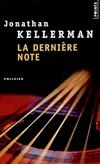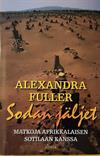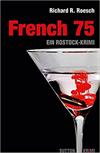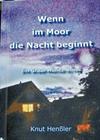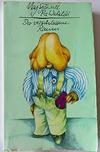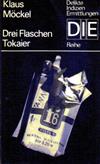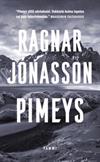
The Piano Tuner
2 journalers for this copy...
Finished January 11. 2007: Mason, Daniel (2002). The Piano Tuner. London: Picador (357 p.)
Back cover discription
‘Engrossing…the reader falls under the spell that the author is weaving, surrendering to the story’s exotic magic’ The Times
On a misty London afternoon in 1886, piano tuner Edgar Drake receives a strange request from the War Office: he must leave his wife, and his quiet life in London, to travel to the jungles of Burma to tune a rare Erard grand piano. The piano belongs to Surgeon-Major Anthony Carroll, an enigmatic British officer, whose success at making peace in the war-torn Shan States is legendary, but whose unorthodox methods have begun to attract suspicion.
So begins the journey of the soft-spoken Edgard across Europe, the Red Sea, India, Burma, and at last into the remote highlands of the Shan States. En route he is entranced by the Doctor’s letters and by the shifting cast of tale-spinners, soldiers, and thieves who cross his path. As his captivation grows, however, so do his questions: about the Doctor’s true motives, about an enchanting and elusive woman who travels with him into the jungle, about why he came. And, ultimately, about whether he will be able to return home unchanged to the woman who awaits him there…
‘Mason’s novel is richly imagined…as an adventure story it is supreme’ Daily Mail
Synopsis (from Amazon)
Edgar Drake is a quiet, middle-aged piano tuner in Victorian London with a nice job, a nice house and a good marriage when he receives an unusual commission: the British War Office asks him to travel to the Burmese jungle to tune the precious grand piano of a slightly eccentric, but very important, medical doctor, who is capable of arranging peace with the rebelling princes of the Shan states. After a trip that brings Edgar, who has never left England before, to exotic places like Alexandria, Aden en India, he arrives in Burma, where everything is different. But somehow he seems to cope very well, really eager to learn the habits of the country and its people.When the trip to his final destination, Mae Lwin, is endlessly postponed for unknown reasons, he travels illegally to the idyllic hamlet. He meets the doctor and his lovely Burmese girlfriend, tunes the piano and gets caught up in political intrigues that he cannot begin to fathom. In the end his love for Burma leads to his downfall.
And what did I think?
It took me a while to finish the story. It develops slowly and is very detailed in descriptions. When the action is there, finally - Edgar Drake has reached Burma and Anthony Carroll - I was captivated. This book taught me a lot, about piano tuning, about Burma, about British colonialism.
Some citations and details to remember:
The deaf man on a ship - his deafness caused by a song - still looking for someone who can tell him which song he heard.
***
They floated for many hours, and the river dropped swiftly through steep defiles, past overhanging crags and cliffs. Finally, at a wide bend, Edgar saw a collection of flickering lights. The river carried them towards it. He could discern buildings, then movement on the bank. They pulled up next to a small jetty. There three men stood watching them, all in pasos, al shirtless. One was taller than the rest, his skin pale, a thin cigar hanging from the edge of his mouth. As the boat slowed, the man took the cigar and flicked it into the water. He reached down and extended a hand to Khin Myo, who gathered up her hta main and climbed onto the jetty. There she bowed slightly and moved forward, slipping into the brush with ease of one who had been there before.
Edgar climbed out of the boat.
The man looked at him without speaking. The piano tuner’s clothes were still soaked with mud, his hair matted against his forehead. He could feel the dried mud on his face crack as he smiled. There was a long silence and then he slowly raised his hand.
He had thought about this moment for weeks and about what he would say. The moment called for words fit for History, to be remembered and recorded once the Shan States were finally won and the empire secured.
‘I am Edgar Drake,’ he said. ‘I am here to repair a piano.’ (p. 182)
***
He stood and watched her and for a moment she held his gaze, and in the deep recesses of his chest he felt something stir, a longing that she would invite him to her room, to dry off only, of course, he would never ask more. To dry off only, and then in the darkness of the room, scented with coconut and cinnamon, a wish that perhaps, bolder, deliberate, that their fingers would meet and entwine and they would stand like that for a moment before she looked up and he looked down. And he wondered if she thought the same as they stood outside and felt the coolness of the water on their skin.
And perhaps it could have been had Edgar acted with the spontaneity of the rain, had he moved towards her with the same boldness with which water falls. But not now. This expects too much of a man whose life is defined by creating order so that others may make beauty. It is expecting too much of one who makes rules to ask that he break them. And so, after a long silence, as they both stand and listen to the rain, his voice cracks and he says, ‘We’d better change then. I must find dry clothes.’ Fleeting words that mean little and much. (p. 268)
***
He began with Bach’s prelude and fugue in C sharp minor, the fourth piece of Bach’s collections of preludes and fugues known as The Well-Tempered Clavier, or as simply The Forty-Eight after the number of prelude variations, which are arranged into two books, each of twenty-four chapters. It was a tuner’s piece, an exploration of the possibilities of sound, and a series that Edgar knew from testing the tuning of professional pianos. He had always called it a testament to the art of tuning. Before the development of equal temperament, the even spacing of notes, it was impossible to play the entire piece on the same instrument. But with equally spaced notes the possibilities suddenly seemed endless.
He played through the prelude, the sound rose and fell, and he felt himself sway as he played. There is much I could tell the Doctor, he thought, about why I have chosen it. That it is a piece bound by strict rules of counterpoint, as all fugues are, the song is but an elaboration of one simple melody, the remainder of the piece destined to follow the rules established in the first few lines. To me this means beauty is found in order, in rules – he may make what he wishes from this in terms of law and treaty signing. I could tell him that it is a piece without a commanding melody, that in England many people dismiss it as too mathematical, as lacking a tune which can be held or hummed. Perhaps he knows this already. But if a Shan does not know the same songs, then just as I have been confused by their melodies, so might the Prince be confused by ours. So I chose something mathematical, for this is universal, all can appreciate complexity, the trance found in patterns of sound.
There are other things he could say, of why he began with the fourth prelude and not the first, for the fourth is a song of ambiguity and the first a melody of accomplishment, and it is best to begin courtships with modesty. Or that he chose it simply because he often felt deeply moved when he heard it. There is emotion in the notes, If it is less accessible than other pieces, perhaps this is why it is so much stronger.
The piece began low, in the bass strings, and as it increased in complexity soprano voices entered, and Edgar felt his whole body move towards the right and remain there, a journey across the keyboard, I am like the puppets moving on their stage in Mandalay. More confident now, he played and the song slowed, and when at last he finished he had almost forgotten that others were watching. He raised his head and looked across the room to the sawbwa, who said something to the Blue Monk and then motioned for Edgar to continue. Beside the sawbwa, he thought he could see the Doctor smile. And so he began again, now D major, now D minor, and forward through each scale, moving up, each tune a variation on its beginnings, structure giving rise to possibilities. He played into the remoter scales, as his old master had called them, and Edgar thought how fitting a name this was for a piece played into the night of the jungle, I can never again believe that Bach did not leave Germany.
He played for nearly two hours, to a place where, halfway in the piece, there is a break, like a rest house on a lonely road, which settles in the wake of the prelude and fugue in B minor. On the last note his fingers stopped and rested on the keyboard and he turned his head and looked out over the room. (p. 278-9)
***
[Carroll] […] ‘I had a wife once. And a daughter – a tiny baby who was mine for one day. There is a Shan saying that when people die it is because they have done what they needed to, because they are too good for this world. I think of her when I hear them say this.’ (p. 289)
***
Seing To nodded sagely and spoke, this time in a sober tone.
‘What did he say?’ asked Edgar. ‘More questions about my wife, I suppose?’
‘No. He asked if you wanted to hear a story, but I told him not to bother you.’
Edgar was surprised, ‘No, I would be interested. What is the story?’
‘Nothing really, I don’t know why he is so insistent that I tell you.’
‘Do tell me. I am rather curious now.’
‘Maybe you have heard it before. It is famous. It is about the leip-bya - a Burmese word. It is a Burmese story, so I don’t know it well like Seing To. His mother is Burmese. The leip-bya, it is a kind of spirit, with wings like a butterfly, but it flies at night.’
‘A moth, perhaps.’ There was something about these words which bothered him, as if he had heard them before. ‘I am unfamiliar with this story,’ he said.
‘Actually, maybe it is not a story. Maybe just a belief. Some Burmese say that the life of man lies in a spirit that is like a … moth. The spirit stays in his body, a man cannot live without it. The Burmese also say that the leip-bya is the reason for dreams. When a man sleeps, the leip-bya flies from his mouth and goes about here and there, and sees things on its journey, and these are dreams. The leip-bya must always return to a man by morning. This is why the Burmese don’t want to wake sleeping people. Perhaps the leip-bya is very far away and it cannot return home fast enough.’
‘And then?’
‘If the leip-bya is lost, or if in its journey it is caught and eaten by a bilu - how do you say … an evil spirit – then this is a man’s final sleep.’ (p. 324-5)
Back cover discription
‘Engrossing…the reader falls under the spell that the author is weaving, surrendering to the story’s exotic magic’ The Times
On a misty London afternoon in 1886, piano tuner Edgar Drake receives a strange request from the War Office: he must leave his wife, and his quiet life in London, to travel to the jungles of Burma to tune a rare Erard grand piano. The piano belongs to Surgeon-Major Anthony Carroll, an enigmatic British officer, whose success at making peace in the war-torn Shan States is legendary, but whose unorthodox methods have begun to attract suspicion.
So begins the journey of the soft-spoken Edgard across Europe, the Red Sea, India, Burma, and at last into the remote highlands of the Shan States. En route he is entranced by the Doctor’s letters and by the shifting cast of tale-spinners, soldiers, and thieves who cross his path. As his captivation grows, however, so do his questions: about the Doctor’s true motives, about an enchanting and elusive woman who travels with him into the jungle, about why he came. And, ultimately, about whether he will be able to return home unchanged to the woman who awaits him there…
‘Mason’s novel is richly imagined…as an adventure story it is supreme’ Daily Mail
Synopsis (from Amazon)
Edgar Drake is a quiet, middle-aged piano tuner in Victorian London with a nice job, a nice house and a good marriage when he receives an unusual commission: the British War Office asks him to travel to the Burmese jungle to tune the precious grand piano of a slightly eccentric, but very important, medical doctor, who is capable of arranging peace with the rebelling princes of the Shan states. After a trip that brings Edgar, who has never left England before, to exotic places like Alexandria, Aden en India, he arrives in Burma, where everything is different. But somehow he seems to cope very well, really eager to learn the habits of the country and its people.When the trip to his final destination, Mae Lwin, is endlessly postponed for unknown reasons, he travels illegally to the idyllic hamlet. He meets the doctor and his lovely Burmese girlfriend, tunes the piano and gets caught up in political intrigues that he cannot begin to fathom. In the end his love for Burma leads to his downfall.
And what did I think?
It took me a while to finish the story. It develops slowly and is very detailed in descriptions. When the action is there, finally - Edgar Drake has reached Burma and Anthony Carroll - I was captivated. This book taught me a lot, about piano tuning, about Burma, about British colonialism.
Some citations and details to remember:
The deaf man on a ship - his deafness caused by a song - still looking for someone who can tell him which song he heard.
***
They floated for many hours, and the river dropped swiftly through steep defiles, past overhanging crags and cliffs. Finally, at a wide bend, Edgar saw a collection of flickering lights. The river carried them towards it. He could discern buildings, then movement on the bank. They pulled up next to a small jetty. There three men stood watching them, all in pasos, al shirtless. One was taller than the rest, his skin pale, a thin cigar hanging from the edge of his mouth. As the boat slowed, the man took the cigar and flicked it into the water. He reached down and extended a hand to Khin Myo, who gathered up her hta main and climbed onto the jetty. There she bowed slightly and moved forward, slipping into the brush with ease of one who had been there before.
Edgar climbed out of the boat.
The man looked at him without speaking. The piano tuner’s clothes were still soaked with mud, his hair matted against his forehead. He could feel the dried mud on his face crack as he smiled. There was a long silence and then he slowly raised his hand.
He had thought about this moment for weeks and about what he would say. The moment called for words fit for History, to be remembered and recorded once the Shan States were finally won and the empire secured.
‘I am Edgar Drake,’ he said. ‘I am here to repair a piano.’ (p. 182)
***
He stood and watched her and for a moment she held his gaze, and in the deep recesses of his chest he felt something stir, a longing that she would invite him to her room, to dry off only, of course, he would never ask more. To dry off only, and then in the darkness of the room, scented with coconut and cinnamon, a wish that perhaps, bolder, deliberate, that their fingers would meet and entwine and they would stand like that for a moment before she looked up and he looked down. And he wondered if she thought the same as they stood outside and felt the coolness of the water on their skin.
And perhaps it could have been had Edgar acted with the spontaneity of the rain, had he moved towards her with the same boldness with which water falls. But not now. This expects too much of a man whose life is defined by creating order so that others may make beauty. It is expecting too much of one who makes rules to ask that he break them. And so, after a long silence, as they both stand and listen to the rain, his voice cracks and he says, ‘We’d better change then. I must find dry clothes.’ Fleeting words that mean little and much. (p. 268)
***
He began with Bach’s prelude and fugue in C sharp minor, the fourth piece of Bach’s collections of preludes and fugues known as The Well-Tempered Clavier, or as simply The Forty-Eight after the number of prelude variations, which are arranged into two books, each of twenty-four chapters. It was a tuner’s piece, an exploration of the possibilities of sound, and a series that Edgar knew from testing the tuning of professional pianos. He had always called it a testament to the art of tuning. Before the development of equal temperament, the even spacing of notes, it was impossible to play the entire piece on the same instrument. But with equally spaced notes the possibilities suddenly seemed endless.
He played through the prelude, the sound rose and fell, and he felt himself sway as he played. There is much I could tell the Doctor, he thought, about why I have chosen it. That it is a piece bound by strict rules of counterpoint, as all fugues are, the song is but an elaboration of one simple melody, the remainder of the piece destined to follow the rules established in the first few lines. To me this means beauty is found in order, in rules – he may make what he wishes from this in terms of law and treaty signing. I could tell him that it is a piece without a commanding melody, that in England many people dismiss it as too mathematical, as lacking a tune which can be held or hummed. Perhaps he knows this already. But if a Shan does not know the same songs, then just as I have been confused by their melodies, so might the Prince be confused by ours. So I chose something mathematical, for this is universal, all can appreciate complexity, the trance found in patterns of sound.
There are other things he could say, of why he began with the fourth prelude and not the first, for the fourth is a song of ambiguity and the first a melody of accomplishment, and it is best to begin courtships with modesty. Or that he chose it simply because he often felt deeply moved when he heard it. There is emotion in the notes, If it is less accessible than other pieces, perhaps this is why it is so much stronger.
The piece began low, in the bass strings, and as it increased in complexity soprano voices entered, and Edgar felt his whole body move towards the right and remain there, a journey across the keyboard, I am like the puppets moving on their stage in Mandalay. More confident now, he played and the song slowed, and when at last he finished he had almost forgotten that others were watching. He raised his head and looked across the room to the sawbwa, who said something to the Blue Monk and then motioned for Edgar to continue. Beside the sawbwa, he thought he could see the Doctor smile. And so he began again, now D major, now D minor, and forward through each scale, moving up, each tune a variation on its beginnings, structure giving rise to possibilities. He played into the remoter scales, as his old master had called them, and Edgar thought how fitting a name this was for a piece played into the night of the jungle, I can never again believe that Bach did not leave Germany.
He played for nearly two hours, to a place where, halfway in the piece, there is a break, like a rest house on a lonely road, which settles in the wake of the prelude and fugue in B minor. On the last note his fingers stopped and rested on the keyboard and he turned his head and looked out over the room. (p. 278-9)
***
[Carroll] […] ‘I had a wife once. And a daughter – a tiny baby who was mine for one day. There is a Shan saying that when people die it is because they have done what they needed to, because they are too good for this world. I think of her when I hear them say this.’ (p. 289)
***
Seing To nodded sagely and spoke, this time in a sober tone.
‘What did he say?’ asked Edgar. ‘More questions about my wife, I suppose?’
‘No. He asked if you wanted to hear a story, but I told him not to bother you.’
Edgar was surprised, ‘No, I would be interested. What is the story?’
‘Nothing really, I don’t know why he is so insistent that I tell you.’
‘Do tell me. I am rather curious now.’
‘Maybe you have heard it before. It is famous. It is about the leip-bya - a Burmese word. It is a Burmese story, so I don’t know it well like Seing To. His mother is Burmese. The leip-bya, it is a kind of spirit, with wings like a butterfly, but it flies at night.’
‘A moth, perhaps.’ There was something about these words which bothered him, as if he had heard them before. ‘I am unfamiliar with this story,’ he said.
‘Actually, maybe it is not a story. Maybe just a belief. Some Burmese say that the life of man lies in a spirit that is like a … moth. The spirit stays in his body, a man cannot live without it. The Burmese also say that the leip-bya is the reason for dreams. When a man sleeps, the leip-bya flies from his mouth and goes about here and there, and sees things on its journey, and these are dreams. The leip-bya must always return to a man by morning. This is why the Burmese don’t want to wake sleeping people. Perhaps the leip-bya is very far away and it cannot return home fast enough.’
‘And then?’
‘If the leip-bya is lost, or if in its journey it is caught and eaten by a bilu - how do you say … an evil spirit – then this is a man’s final sleep.’ (p. 324-5)
Journal Entry 2 by Wilmar at Controlled Release in Controlled Release, A Bookcrossing member -- Controlled Releases on Wednesday, March 28, 2007
Released 17 yrs ago (3/28/2007 UTC) at Controlled Release in Controlled Release, A Bookcrossing member -- Controlled Releases
WILD RELEASE NOTES:
RELEASE NOTES:
Sent on today to ielfling in New Zealand as part of a trade (I received Lots of Love by Fiona Walker).
Happy BookCrossing!
Sent on today to ielfling in New Zealand as part of a trade (I received Lots of Love by Fiona Walker).
Happy BookCrossing!
Oh my goodness!!! Booky excitement, PLUS a new t-shirt (which fits, yes thank you!) Thanks so much wilmar, what a fantastic surprise. Now I can advertise bookcrossing to all and sundry (when it gets a bit warmer, we're just moving into chilly weather). The book looks fabulous, too. I'll journal it when I've read it, and will probably pass it on to my mum, for starters.


